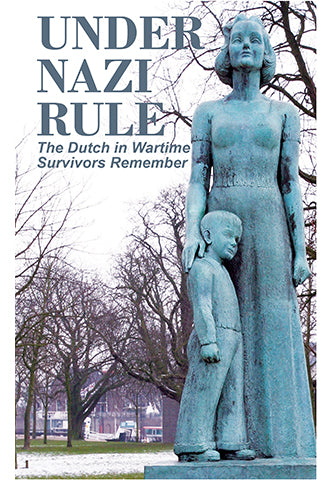Dutch the store
Under Nazi Rule
Couldn't load pickup availability
The Dutch in Wartime: Survivors Remember is a series of books with wartime memories of Dutch immigrants to North America, who survived the Nazi occupation of The Netherlands.
Book 2: Under Nazi Rule, is about the hardships and fears of living through war and occupation. Every normal task becomes an almost impossible, sometimes dangerous, chore.
Designed and written to be easily accessible to readers of all ages and backgrounds, these books contain important stories about the devastating effects of war and occupation on a civilian population.
Edited by Tom Bijvoet.
86 pages
Historical background, map and 19 wartime memories.
ISBN: 978-0-3968308-3-9
On the cover: ‘War Memorial’ in Gorinchem, sculpture by Irma van Rappard-von Maubeuge commemorating the defiant and courageous stance of the civilian population during the German occupation. (Photo: Gemeente Gorinchem)
READ AN EXCERPT
They were buried with their aircraft
In May 1940 we lived in Speers, a village not far from Sneek in Friesland. My twin brother Klaas and I really loved it there. On May 10 and 11 the German soldiers came down the highway on bikes and horses. At that time we were ten years old and our father worked for a dairy farmer.
In 1942 all food was scarce and was only given through food coupons. So my dad said we should move to a mixed farm where we could have plenty of potatoes and grain. One night before we moved my father yelled that we had to come down out of bed. It was extremely noisy outside. A big English bomber flew over our house very low with two of its engines on fire. It circled back around over the house and lost the two engines. Then it flew past two homes and came down in the meadows 500 feet from our house. It burned like hell. There were seven people in the burning aircraft, one from New Zealand, three from Canada, and three Americans. Dead. Only one was found outside the aircraft and the Germans buried him in the cemetery at the neighboring village of Deersum. The rest were buried with their aircraft right there in the meadow.
In May of 1942 we moved to a farm near the town of Tzum. We really enjoyed life there. Because there were no books or pens to write with we only went to school for one and a half years and then they closed the school. So my Dad said we had to help the farmer in the fields during the summer. We had plenty to eat including duck eggs that we found in the fields. The only thing we did not have was wood to warm our food. Most days we would go into the fields and get any branches we could find. The last year, during the winter, it was extremely cold and there were no more trees to find. Every day we went at noon to Tzum to the milk factory where they would warm our food for us and we could take it back home. They always helped us first because we had to walk the farthest, three miles.
In the evenings we would go in the field to steal wood off the bridges to use to warm the house. One day, dad and my brother and I were in the meadows looking for wood, because we had nothing left, and had just arrived at a bridge when an English airplane came over. It dropped a flare lighting the entire meadow so we jumped in a ditch. After 20 minutes it was dark again and Dad did not trust what was going on and took us home. That night we went to bed and around midnight the aircraft came back. It dropped 24 containers of weapons for the Resistance. Dad told us not to go out of the house to help because it was too dangerous. The farmer we stayed with had been hiding a Dutch judge who worked with the Resistance. The judge came to our house and asked us to help gather weapons from two containers that had burst open.
Cecil Adema
Ancaster, Ontario

